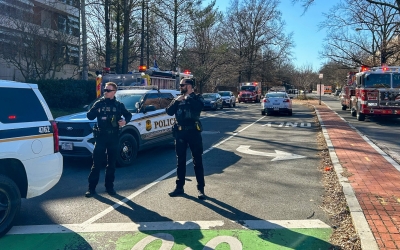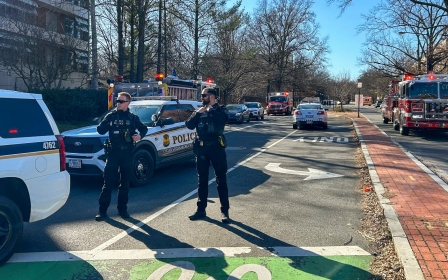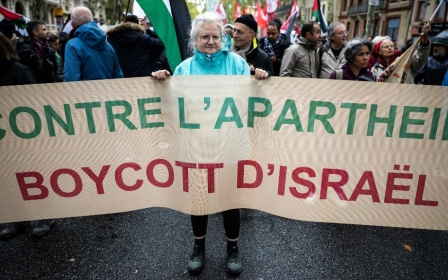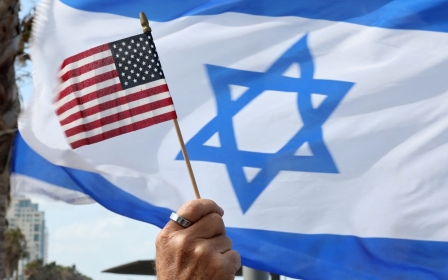Aaron Bushnell: The US air man who shouted 'Free Palestine' before lighting himself on fire
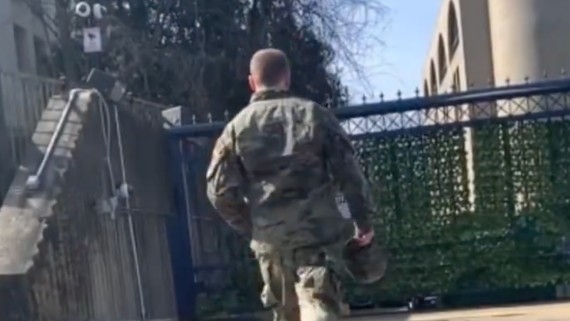
Aaron Bushnell, an active-duty member of the US Air Force, died on Sunday after setting himself on fire in front of the Israeli embassy in Washington, DC, in an act of protest against the genocide in Gaza.
His last words were “Free Palestine”.
“I will no longer be complicit in genocide. I’m about to engage in an extreme act of protest, but compared to what people are experiencing in Palestine at the hands of their colonisers, it’s not extreme at all. This is what our ruling class has decided will be normal. Free Palestine," he said in a video he made while walking in front of the embassy.
The Pentagon said on Monday that his death was a “tragic event”.
Pentagon spokesman Major General Patrick Ryder said US Defence Secretary Lloyd Austin was following the situation.
Bushnell, 25, was dressed in military attire as he used a lighter to set himself on fire after dousing himself in liquid. He recorded the entire incident on Twitch, a popular streaming platform, which has removed the video.
In the video, two law enforcement officials approach him as he’s burning. One of them is pointing a gun at him. The other says, “I don't need guns, I need fire extinguishers!"
Bushnell was said to be engulfed in flames for approximately one minute before law enforcement officials extinguished the flames.
A Facebook post credited to Bushnell was widely shared on Twitter on Monday, with the following content: “Many of us like to ask ourselves, ‘What would I do if I was alive during slavery? Or the Jim Crow South? Or apartheid? What would I do if my country was committing genocide?’ The answer is, you’re doing it. Right now.”
Bushnell lived in San Antonio, Texas, and was pursuing a Bachelor’s degree in software engineering.
His LinkedIn page says: “Throughout my time in the military in both leadership and followership roles, as well as prior work experience in a variety of civilian roles, I have thrived in team environments and gained very good communication skills.”
This is not the first time incidents such as this have taken place in the US in protest against wars, and it is the second such act of self-immolation since the war on Gaza started in October.
In December, a female protester self-immolated outside an Israeli consulate building in Atlanta, in what US police described as “an extreme act of political protest". She sustained third-degree burns to her body. A Palestinian flag was found at the scene. Her name or age has never been released by authorities.
On 2 November 1965, Norman Morrison, an anti-war activist, covered himself in kerosene and ignited himself on fire below the office of Secretary of Defence Robert McNamara at the Pentagon, in protest against the United States' participation in the Vietnam War.
In 1993, Graham Bamford poured gasoline all over himself and burnt himself alive in front of the Lower House of the British Parliament and during the middle of the day to point to the suffering of those in Bosnia dying from genocide.
Media outlets criticised
Following the incident, mainstream media outlets came under scrutiny for their choice of headlines. The New York Times headline said, “Man Dies After Setting Himself on Fire Outside Israeli Embassy in Washington, Police Say.”
CNN: US airman dies after setting himself on fire outside Israeli Embassy in Washington
BBC: Aaron Bushnell: US airman dies after setting himself on fire outside Israeli embassy in Washington
Washington Post: Airman dies after setting himself on fire outside Israeli Embassy in D.C.
“Why did he do it?” Assal Rad, a user on X wrote. “None one of [the headlines] mentions the words ‘Gaza’ or ‘genocide’, the reason for Aaron’s protest, or the word ‘Palestine’, his last words spoken.”
Reactions
Staffers for Ceasefire, a group of staffers in the Biden administration who are pressuring the administration towards a ceasefire, mourned the loss of Bushnell and called for an immediate and permanent ceasefire in Gaza.
“President Biden, our Commander-in-Chief, continues to ignore staff dissent over the mass suffering caused by our leaders’ complicity,” the statement read.
“President Biden has the unique power to mitigate the harms being done - not through useless backchannel conversations, but through established processes of international law and strong diplomacy. He can choose to change our current trajectory of unnecessary destruction.”
The Palestinian Youth Movement said in an Instagram post, “While US media is already spinning the story as one of a mentally ill, troubled youth, Aaron’s own message in the seconds before his act demonstrate the moral clarity and foresight with which he pondered and ultimately decided upon his act.”
They added that the “word for martyr in Arabic, ‘shaheed,’ translates to ‘witness,’ or one whose final moment in life is as a witness to injustice”.
“Aaron Bushnell is a martyr, whose final moment was spent in the heat of one naked, unflinching truth: the moral conscience of every human being, from the belly of the beast to the farthest reaches of the Earth, demands immediate attention and action to end the horrors before us,” the statement said.
The People’s Forum, a community centre working for the working class and marginalised communities in New York City, is helping to lead a vigil for Bushnell on 27 February, along with the Palestinian Youth Movement.
In a post on Instagram, they wrote that Bushnell “made the ultimate sacrifice to end a genocide perpetrated, supported, and financed by the Biden Administration”.
“The system is guilty of crimes against humanity in Gaza and Aaron Bushnell took a heroic stand. We honour him and his sacrifice.”
This article is available in French on Middle East Eye French edition.
Middle East Eye propose une couverture et une analyse indépendantes et incomparables du Moyen-Orient, de l’Afrique du Nord et d’autres régions du monde. Pour en savoir plus sur la reprise de ce contenu et les frais qui s’appliquent, veuillez remplir ce formulaire [en anglais]. Pour en savoir plus sur MEE, cliquez ici [en anglais].


